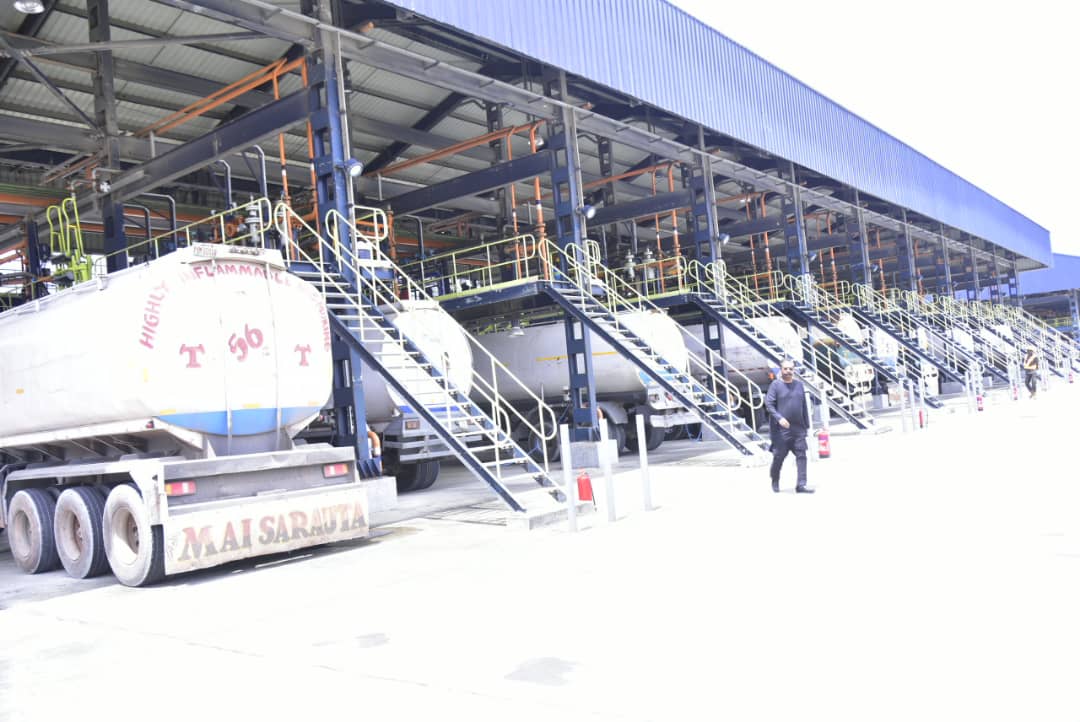Nigeria
CBN: Dangote Petrol Set to Reduce Transport Costs and Lower Food Prices

The Central Bank of Nigeria (CBN) has stated that petrol from the Dangote Refinery will help ease transportation costs and reduce food prices. Discover how this development will impact the economy.
The Central Bank of Nigeria (CBN) has indicated that the commencement of petroleum product distribution from the Dangote Refinery in Lagos is anticipated to reduce transportation costs and alleviate food inflation.
During a press conference held on Tuesday following the 297th meeting of the Monetary Policy Committee (MPC) in Abuja, CBN Governor Olayemi Cardoso made this announcement.
“The committee is optimistic that the distribution of refined petroleum products from Dangote Refinery will lead to a decrease in transportation expenses and provide significant support in mitigating food price pressures in the short to medium term.
“This development is also expected to lessen the demand for foreign exchange related to the importation of refined petroleum products, which will positively impact external reserves and enhance the overall balance of payments,” Cardoso stated.
Additionally, the CBN Governor revealed the committee’s decision to increase the Monetary Policy Rate (MPR) by 50 basis points, raising it from 26.75% to 27.25% in an effort to control the inflation rate, which currently stands at 32.15%.
As per the Consumer Price Index report recently published by the National Bureau of Statistics (NBS), the headline inflation rate decreased to 32.15% in August 2024, while food inflation was recorded at 37.52% for the same month.
The NBS reported that the food inflation rate for August 2024 was 37.52% on a year-on-year basis, reflecting an increase of 8.18 percentage points compared to the rate of 29.34% noted in August 2023.
The rise in food inflation on a year-on-year basis has been attributed to price increases in various items, including bread, maize, grains, guinea corn, cereals, yam, Irish potatoes, water yam, cassava tuber, palm oil, and vegetable oil, among others.
Cardoso indicated that the potential for food inflation remains influenced by factors such as flooding, rising energy costs, a shortage of Premium Motor Spirit (PMS), and, crucially, security issues within agricultural communities.
READ ALSO: Cardoso Explains How Money Printing and Oil Price Crash Harmed Nigeria’s Economy
He noted that given the significant role of food in the Consumer Price Index (CPI), members of the Monetary Policy Committee (MPC) acknowledge the Federal Government’s initiatives to tackle insecurity in farming areas and emphasized the importance of maintaining these efforts.
Furthermore, the MPC commended the Federal Government of Nigeria for its ongoing initiatives to alleviate supply shortages through the establishment of duty-free import channels for food products.
The Nigerian National Petroleum Company Limited (NNPCL) commenced the loading of its initial petrol shipment from the Dangote Refinery in mid-September, reporting a purchase price of N898 per litre from the private facility.
Prior to sourcing petrol from the Dangote Refinery, NNPCL’s retail stations in Lagos offered petrol at approximately N855 per litre, but indicated that the price for Dangote petrol would be N950 per litre in Lagos and N1,019 in Borno.
However, the Dangote Refinery refuted claims of selling petrol to NNPCL at N898. In response, NNPCL maintained that it procured petrol from the Dangote Refinery at that price and challenged the refinery to disclose its selling price. NNPCL also provided a detailed pricing structure for Dangote petrol at its filling stations nationwide.
In the meantime, the Independent Petroleum Marketers Association of Nigeria (IPMAN) expressed that it is illogical for petrol sourced from the Dangote Refinery to be priced higher than imported alternatives.
Last December, Aliko Dangote, a prominent industrialist in Africa, launched operations at his $20 billion facility located in Lagos, which has a capacity of 350,000 barrels per day.
The refinery, which initially faced regulatory challenges, aims to reach its full capacity of 650,000 barrels per day by the year’s end.
It has already started supplying diesel and aviation fuel to marketers across the country, in addition to petrol.
Nigeria, the most populous country in Africa, continues to grapple with energy issues, particularly with its state-owned refineries.
